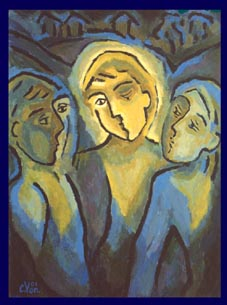Easter Sunday
Mark 16:1-18
And
when the Sabbath was over,
Mary Magdalene, Mary the mother of James, and Salome
bought spices so that they might go and anoint Him. And very early on the first
day of the week, they went to the tomb just as the sun was rising. And they
said to one another, "Who will roll away the stone for us from the door of
the tomb?" Julia Stankova
And looking up, they saw that the stone was rolled back—and it was very large. And they went into the tomb. There they saw a young man sitting on the right side, clad in a white robe, and they were beside themselves with amazement. And he said to them, "Do not be startled; you seek Jesus of Nazareth the Crucified One. He is risen; He is not here; see, there is the place where they laid Him. But go and say to his disciples and Peter, 'He will lead you to Galilee. There you will see Him as He promised you.'"
And they went out and fled from the tomb in great haste, for trembling and astonishment had come upon them, and being awestruck, they were unable to say anything to anyone about what they had experienced.
When He had risen early on the first day of the week, He appeared first to Mary Magdalene from whom He had driven out seven demons. And she went and told those who had walked with Him, as they mourned and wept. But when they heard that He was alive and had been seen by her, their hearts could not grasp it.
After this, He appeared in another form to two of
them on the way as they were walking over the fields. And they went back and
told the rest, but they could not open their hearts to their words either. Afterward, He appeared to the eleven themselves
as they were celebrating the meal. He reproached them for their lack of
openness and their hardness of heart
because they had not wanted to believe those who had seen Him, the Risen One. Julia Stankova
And He said to them, "Go
into all the world and proclaim the new message from the realm of the angels to
the whole of creation. Whoever unites their heart with it and is immersed in me will attain salvation. But
whoever closes themselves against it [or, does not let the
power of selflessness into his heart, or, does not let the power of My
Self into his heart] will meet their downfall. And spiritual
powers will stand by those who unite
themselves with it and will attend their path: Through the power of my being they will drive out demons; they will speak a new language; serpents they will
make upright, and poisons they drink will not harm them. They will lay their
hands on the sick and give healing forces to them."*
Easter Sunday
April 17,
2022
Mark 16:1-18
 |
| Sombart |
a large stone rolled over the entrance. When He rose, His rising was accompanied by an earthquake. The foundations of the world were shaken by this mighty event, for Death itself had been infused with a new form of Life. An angel rolls back the stone, revealing the place where the transformation of the world had taken place. The earth shone with a new light.
The cave is also a picture of the human heart. Each year Christ dies into us, is buried in each and every one of us. And every year at Easter, He rises in and through us.
Who rolls away for us the stone from the tomb of the heart, the stone of hardness of heart, the stone of not wanting to believe and trust that He lives?
He who was entombed is now alive, in us, and everywhere. He lives in the very light that shines, in the very air we breathe. He walks in the spirit before us. We seek to find Him, for He is the very meaning and essence of our true being. We know that without Him, we are not complete. We know, in the words of the poet:
 |
| Corrine Vonaesch |
I am this one walking beside me
whom I do not see,
Whom
at times I manage to visit,
And
whom at other times I forget;
The
one who remains silent when I talk
The
one who forgives, sweet, when I hate,
The
one who takes a walk where I am not.
The one who will remain standing when I die.*
The One who
walks beside me, before me—He whom I do not see—because of Him, I know that the
grave is empty. Because of Him, the heart is full. In Him, I too will rise,
through Him, into new life.
https://www.thechristiancommunity.org/christian-festivals/
*Traditional translation: "Go into all the world and preach the good news to all creation. Whoever believes and is baptized will be saved, but whoever does not believe will be condemned. And these signs will accompany those who believe: In my name, they will drive out demons; they will speak in new tongues; they will pick up snakes with their hands, and when they drink deadly poison, it will not hurt them at all; they will place their hands on sick people and they will get well."









